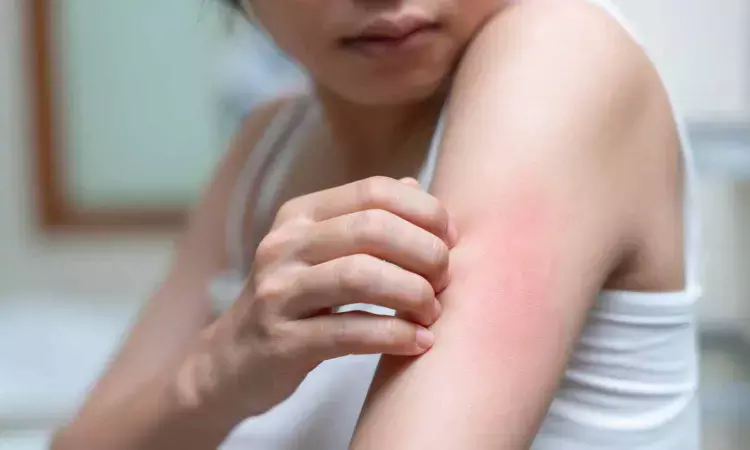- Home
- Medical news & Guidelines
- Anesthesiology
- Cardiology and CTVS
- Critical Care
- Dentistry
- Dermatology
- Diabetes and Endocrinology
- ENT
- Gastroenterology
- Medicine
- Nephrology
- Neurology
- Obstretics-Gynaecology
- Oncology
- Ophthalmology
- Orthopaedics
- Pediatrics-Neonatology
- Psychiatry
- Pulmonology
- Radiology
- Surgery
- Urology
- Laboratory Medicine
- Diet
- Nursing
- Paramedical
- Physiotherapy
- Health news
- Fact Check
- Bone Health Fact Check
- Brain Health Fact Check
- Cancer Related Fact Check
- Child Care Fact Check
- Dental and oral health fact check
- Diabetes and metabolic health fact check
- Diet and Nutrition Fact Check
- Eye and ENT Care Fact Check
- Fitness fact check
- Gut health fact check
- Heart health fact check
- Kidney health fact check
- Medical education fact check
- Men's health fact check
- Respiratory fact check
- Skin and hair care fact check
- Vaccine and Immunization fact check
- Women's health fact check
- AYUSH
- State News
- Andaman and Nicobar Islands
- Andhra Pradesh
- Arunachal Pradesh
- Assam
- Bihar
- Chandigarh
- Chattisgarh
- Dadra and Nagar Haveli
- Daman and Diu
- Delhi
- Goa
- Gujarat
- Haryana
- Himachal Pradesh
- Jammu & Kashmir
- Jharkhand
- Karnataka
- Kerala
- Ladakh
- Lakshadweep
- Madhya Pradesh
- Maharashtra
- Manipur
- Meghalaya
- Mizoram
- Nagaland
- Odisha
- Puducherry
- Punjab
- Rajasthan
- Sikkim
- Tamil Nadu
- Telangana
- Tripura
- Uttar Pradesh
- Uttrakhand
- West Bengal
- Medical Education
- Industry
AACR: Topical treatment offers relief from painful skin rash caused by targeted cancer therapy

Researchers from the UCLA Health Jonsson Comprehensive Cancer Center and The University of Texas MD Anderson Cancer Center have demonstrated that a novel topical BRAF inhibitor gel called LUT014 significantly reduces the severity of an acne-like rash, a common and painful side effect experienced by patients undergoing anti-EGFR therapies for colorectal cancer. The findings of the clinical trial confirm the treatment’s safety and effectiveness.
“The findings offer the first real solution in two decades for managing this rash, which frequently impacts patients receiving targeted therapies for colorectal cancer,” said study co-author Zev Wainberg, MD, professor of medicine at the David Geffen School of Medicine at UCLA. “The ability to effectively treat it with a simple topical gel has the potential to greatly improve quality of life for patients and treatment outcomes.”
Anti-EGFR therapies, such as cetuximab and panitumumab, are a cornerstone of treatment for many cancers, including colorectal cancer. However, they often cause an acneiform rash that frequently leads to impaired quality of life and can lead to dose reductions or discontinuation of treatment, limiting their potential benefits.
LUT014, being developed by Lutris Pharma, works by paradoxically reactivating MAPK, a key signaling pathway in the skin that anti-EGFR therapies shut down. By applying the BRAF inhibitor gel directly to the affected areas, the gel helps restore skin function, reduce inflammation and improve symptoms without impacting the anti-cancer effects of the treatment.
The phase 2 double-blind, placebo-controlled, and randomized study enrolled 118 patients across 23 medical centers. Patients in the study had colorectal cancer and developed moderate to severe rashes while taking cetuximab or panitumumab, two common anti-EGFR treatments.
The participants were randomly divided into three groups. One group used a low-dose gel, another a higher-dose gel, and the third used a placebo gel, which had no active drug. In each case, the gel was applied once a day for 28 days.
The main goal was to see if the rash improved, either by one level of severity or through better quality-of-life scores related to skin issues. The researchers found patients using LUT014 gel experienced marked improvements in rash severity and quality of life compared to those receiving a placebo, without interfering with their cancer treatment.
Nearly 70% in the group using higher-dose gel saw their scores improve compared to about half (48%) of those using the low-dose gel and about one in three (33%) patients using gel with no active drug.
Researchers have shown that it is possible to alleviate skin toxicity without compromising the effectiveness of cancer treatment. This could help patients stay on their treatments longer, reducing the need for dose reductions or discontinuation, which in turn may improve overall treatment outcomes.
“Until now, patients were simply told that the rash was an unavoidable side effect of these treatments, something they had to endure for the sake of fighting their cancer,” said Antoni Ribas, MD, PhD, professor of medicine at the David Geffen School of Medicine and director of the tumor immunology program at the UCLA Health Jonsson Comprehensive Cancer Center, and a study co-author. “But the data is overwhelmingly positive, and this approach not only improves patients' quality of life but also makes the cancer treatment more manageable.”
Reference:
AACR: Topical treatment offers relief from painful skin rash caused by targeted cancer therapy, University of California - Los Angeles Health Sciences, Meeting: AACR Annual Meeting 2025.
Dr Kamal Kant Kohli-MBBS, DTCD- a chest specialist with more than 30 years of practice and a flair for writing clinical articles, Dr Kamal Kant Kohli joined Medical Dialogues as a Chief Editor of Medical News. Besides writing articles, as an editor, he proofreads and verifies all the medical content published on Medical Dialogues including those coming from journals, studies,medical conferences,guidelines etc. Email: drkohli@medicaldialogues.in. Contact no. 011-43720751


